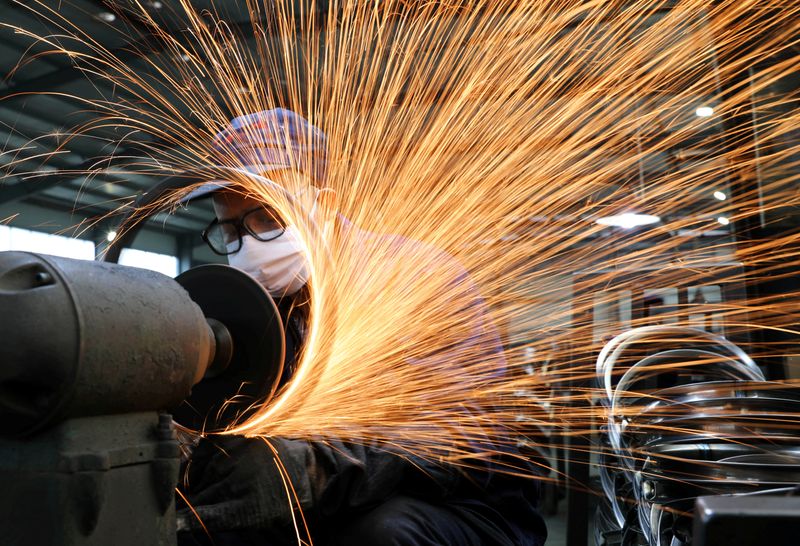BEIJING (Reuters) - China's May factory gate prices rose at their fastest annual pace in over 12 years due to surging commodity prices, highlighting global inflation pressures at a time when policymakers are trying to revitalise COVID-hit growth.
Investors are increasingly worried pandemic-driven stimulus measures could supercharge global inflation and force central banks to tighten policy, potentially curbing the recovery.
China's producer price index (PPI) increased 9.0%, the National Bureau of Statistics (NBS) said on Wednesday, as prices bounced back from last year's pandemic lows.
The PPI rise in May - the fastest on-year gain for any month since September 2008 - was driven by significant price increases in crude oil, iron ore and non-ferrous metals, the NBS said.
Analysts in a Reuters poll had expected the PPI to rise 8.5% after a 6.8% increase in April.
Shortly after the inflation data, the National Development and Reform Commission said China will closely monitor price movements of commodities and step up price forecasts to maintain market order.
"The worry is PPI may hover at an elevated level for an extended period of time, which would create economic headaches if mid- or downstream firms fail to absorb higher costs," said Nie Wen, chief economist at Hwabao Trust.
The PPI surge has yet to substantially feed through to consumer inflation, meaning the People's Bank of China is unlikely to worry for now.
Consumer prices rose 1.3% in May - the biggest year-on-year increase in eight months - but came in below expectations for a 1.6% gain. Consumer inflation remained well below the government's official target of around 3%.
"Producer price inflation is probably close to a peak...we don't expect (consumer price inflation) to rise much above 2% in the coming quarters. As such, (the data) is unlikely to trigger any shift in monetary policy," said Julian Evans-Pritchard, senior China economist at Capital Economics.
But there are some signs Chinese factories, facing already tight margins, are passing on higher raw material costs to overseas clients, which could reinforce the global inflation loop.
(Graphic: China factory gate prices surge at fastest pace in 12 years as commodity costs climb: https://fingfx.thomsonreuters.com/gfx/ce/rlgvddxyovo/ChinaFactoryGatePrices.png)
The release comes as U.S. inflation data on Thursday is being closely watched by investors, who worry another high reading might put pressure on the Federal Reserve to start thinking about tapering its stimulus.
Chinese coal and resource shares rose after the NBS's producer price inflation data, driving the broader stock market higher. [L2N2NR08S]
COMMODITY PRICES
On a monthly basis, the PPI rose 1.6%, up from a 0.9% uptick in April.
Power plants also stocked up on thermal coal to meet surging electricity demand during summer, resulting in a 10.6% month-on-month increase in prices in the coal mining and washing sector, up from 2.8% the previous month, said Dong Lijuan, senior statistician at the NBS.
Prices for commodities including coal, steel, iron ore and copper, which affect the PPI, have surged this year, fuelled by post-lockdown recoveries in demand and ample global liquidity.
China's imports in value terms grew at their fastest pace in 10 years in May, boosted by Chinese purchases of raw materials.
Chinese policymakers have pledged to take measures to cool commodity prices and prevent them from being passed on to consumers.
Recent gains in the yuan had stirred speculation over whether policymakers wanted a stronger currency to offset growing imported price pressures, but the central bank told Reuters this week it will not use the exchange rate as a tool.
NBS data also showed food inflation rose 0.3% in May from a year earlier on higher prices for freshwater fish and eggs, despite still falling pork prices. That compared with a 0.7% drop in food prices in April.

Non-food prices, including airfares, gasoline and diesel prices, accelerated to 5.5%, likely bolstered by China's Labour Day Holiday at the start of May.
On a monthly basis, rising factory input costs have started to be passed onto consumers in the sales of fridges, televisions, laptops, construction materials and summer clothes, but their price gains remained mild, NBS's Dong said.